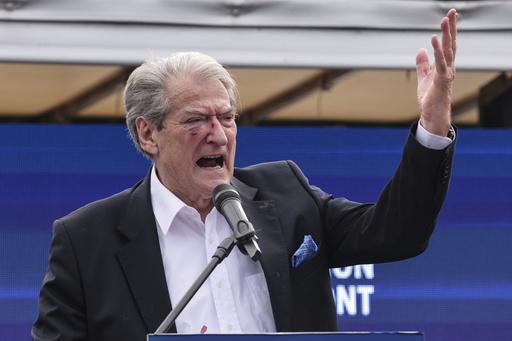
TIRANA, Albania — On Wednesday, an Albanian court lifted the house arrest of former Prime Minister Sali Berisha, who currently heads the opposition Democratic Party and faces charges related to corruption.
The Special Court for Corruption and Organized Crime, responsible for handling cases involving high-ranking officials and politicians, annulled its previous order for Berisha’s house arrest, which had been in effect for nearly a year, though no specific reasons were provided for the decision.
Berisha’s immunity as a member of parliament was revoked in December, leading to his house arrest after he failed to comply with an earlier court requirement to report bi-weekly. Additionally, he had been restricted from international travel, a rule that was overturned by the Constitutional Court just last week.
During his house arrest, the 80-year-old Berisha remained confined to his apartment in central Tirana. Although communication with anyone beyond his family and legal representatives was prohibited, he continued to address small gatherings of supporters outside his residence nightly.
The restrictions on Berisha’s ability to interact and engage physically with his party have posed a significant challenge in the political landscape of Albania, particularly as the country prepares for a parliamentary election scheduled for next spring.
In October of the previous year, prosecutors announced an investigation against Berisha, alleging he misused his political position to aid his son-in-law, Jamarber Malltezi, in privatizing public land for the development of 17 apartment complexes in Tirana.
Following formal corruption charges linked to a property transaction in September, Berisha has rejected the allegations, claiming they are a form of political persecution orchestrated by Prime Minister Edi Rama and his Socialist Party.
Sali Berisha previously served as Albania’s prime minister from 2005 to 2013 and held the presidential office from 1992 to 1997. He successfully regained his seat as a lawmaker for the Democratic Party during the 2021 parliamentary elections.
Both the United States and the United Kingdom have barred Berisha and some of his relatives from entering their territories due to his alleged corrupt activities, with the U.S. imposing this restriction in May 2021 and the U.K. following suit in July 2022.
Supporters and members of the Democratic Party, now part of an opposition alliance, have been actively protesting following the arrests of Berisha and former President Ilir Meta on separate corruption charges, arguing that these allegations are driven by political motives.
The opposition has leveled accusations against the ruling government for corruption, advocating for the establishment of a technocratic caretaker Cabinet ahead of the 2025 parliamentary elections.
The United States and the European Union have encouraged the opposition to engage in dialogue with the government, emphasizing that resorting to violence would not facilitate the nation’s aspirations to integrate into the European Union, which comprises 27 member states.
Earlier this month, Albania began discussions with the EU focused on aligning with its standards concerning the rule of law, democratic institutional operation, and anti-corruption measures. The current prime minister has stated that Albania aims to become a member of the EU by the year 2030.
